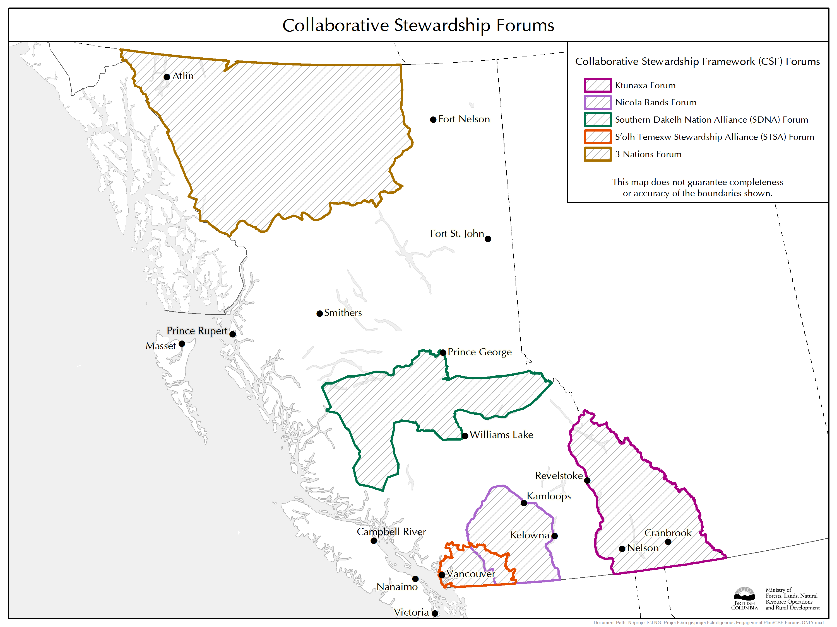Collaborative Stewardship Framework
The Collaborative Stewardship Framework (CSF) was initiated in 2018 as a pilot to test how information reflecting Western and Indigenous knowledge can enhance natural resource decision-making through a collaborative land stewardship approach between the Province and more than 30 First Nations in five CSF forums.
The projects show how Indigenous knowledge can be incorporated into and improve natural-resource management. CSF is designed and implemented collaboratively.
About the Forums
Learn more about each of the five regional CSF forums below and view them on the map. Enabling agreements between participating First Nations and the Province provide the formal basis for collaboration in CSF.
3 Nations Forum
In the northern half of Skeena Region, 3 Nations (Tahltan, Kaska, and Taku River Tlingit) and B.C. are co-designing an approach to shared management of resource values across the territories of the three participating Nations. Collaborative wildlife management is a key focus of the 3 Nations-B.C.
CSF Forums and current projects fall into three categories: Governance and Capacity, Specific Projects, and the Guardian Program. Governance and capacity includes incorporating Indigenous knowledge into shared decision-making, developing trusted and shared information, and co-designing a governance model. Specific projects supported by the forum include monitoring caribou, moose, stone sheep, mountain goat, and other values such as morel mushrooms and water quality. The Guardian program across the 3 Nations is growing in capacity and supports land-use monitoring, wildlife data collection and community education and engagement.
The next steps for the forum include a trial of collaborative wildlife management through pilot projects, developing and implementing community and stakeholder engagement workshops, developing standardized information-gathering and data-sharing agreements, and establishing a co-governance model.
- 3 Nations Website
- 3 Nations-BC Brochure (PDF, 4MB)
Ktunaxa Forum
The Ktunaxa Nation Council is working with the Province in southeast B.C. to inform stewardship decisions on environmental and cultural values. The Ktunaxa Nation Council represents the communities of ʔaq̓am (St. Mary’s Band), ʔakisq̓nuk First Nation, Yaqan Nukiy (Lower Kootenay Band) and Yaq̓it ʔa·knuqⱡiʾit (Tobacco Plains Band). Projects under the CSF Forum include but are not limited to collaborative wildlife stewardship, huckleberry stewardship and the development of a Ktunaxa Guardian program.
Nicola Bands Forum
The Government-to-Government (G2G) Nicola Water Pilot Project’s work takes place in two partial Nations within the respective territories to the Nlaka’pamux and the Syilx people. The Province and the five Nicola Chiefs came together in 2018 with a Memorandum of Understanding to work in partnership to sustainably govern water resources in the Nicola Watershed. Nlaka’pamux and Syilx values, language and knowledge, along with current provincial legislation, will show how to move forward together in this important watershed.
Initially funded by the Province and the BC Freshwater Legacy, the pilot project was selected to be a part of the CSF. This additional support and funding allowed for the forum members of the G2G Nicola Pilot to enhance their scope of work and develop longer-term initiatives.
The G2G Forum members are made up of the five Nicola Chiefs – Upper Nicola, Coldwater, Lower Nicola, Shackan, Nooaitch – and five Provincial representatives from three Ministries: Forests, Lands, Natural Resource Operations and Rural Development; Indigenous Relations and Reconciliation; and Environment and Climate Change Strategy.
There are 13 projects under the umbrella of the G2G Nicola Pilot that are focused on water management, governance and capacity-building. A core committee supports the technical work of these 13 projects, and a secretariat provides administrative and policy support to both the forum and the core committee.
Most recently, the core committee has evolved to the “Core Council” with a greater focus on shared decision-making, opportunities, and proposed priorities that will improve G2G collaboration. In the future, the G2G Nicola Pilot would like to see the development of a Nicola G2G Elder’s council and advisory team. The forum and core committee work to identify and develop solutions that address specific water-management concerns in the Nicola Valley. The G2G partners objective is to develop and recommend a governance approach to sustainable water management in the Nicola Watershed to benefit future generations.
The Southern Dakelh Nation Alliance Forum
The Southern Dakelh Nation Alliance (SDNA) consists of Lhoosk’uz Dené Nation, Lhtako Dené Nation, Nazko First Nation and Ulkatcho First Nation. Together, the SDNA and the Province, through the Hubulhsooninats’Uhoot’Alh: Foundation Framework Agreement, are working collaboratively on key initiatives related to land stewardship and economic development in their territories. The Southern Dakelh Land Stewardship Plan, the Ungulate Working Group and the Southern Dakelh Stewardship Guardian Program are three key stewardship initiatives underway as part of the Collaborative Stewardship Framework. Other work related to forestry, economic development and integration of health and wellness also form part of the SDNA’s progress as part of this program.
The S’ólh Téméxw Stewardship Alliance Forum
The S’ólh Téméxw Stewardship Alliance (STSA) consists of 15 member Nations united under the Stó:lō Strategic Engagement Agreement (SSEA): Cheam First Nation, Kwaw’Kwaw’Apilt First Nation, Scowlitz First Nation, Skawahlook First Nation, Skwah First Nation, Sumas First Nation, Yale First Nation And Aitchelitz First Nation, Shxwhà:y Village, Skowkale First Nation, Soowahlie First Nation, Squiala First Nation, Tzeachten First Nation, Yakweakwioose First Nation. Through the forum, the STSA and the Province aim to develop a common stewardship vision based upon Stó:lō values and the S’ólh Téméxw Use Plan as well as provincial interests and objectives.

